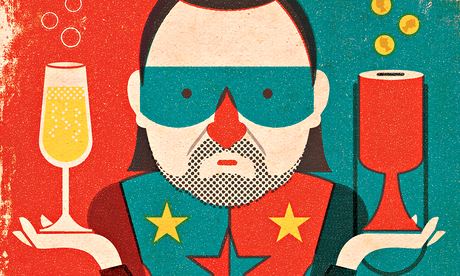
The other day, a pair of Yale University researchers published a study explaining why so many people can't stand Bono. To be fair, that wasn't the way they phrased it; they didn't mention the self-righteous pope-botherer by name. But they did provide convincing evidence for what they called "the tainted altruism effect". This describes the way we judge people extra harshly if we believe their charitable actions are partly motivated by personal gain, whether financial or (as in Bono's case) the burnishing of a celebrity image that might otherwise never have evolved beyond "fairly good songwriter and singer". It is not merely that we think tainted altruism is worse than the purer kind. Rather, the study suggests, we judge those who engage in it as less moral even than those who are openly selfish, and do nothing altruistic at all.
This won't be news to Dan Pallotta, an American fundraiser whose story the Yale researchers tell. In the 90s, Pallotta raised $0.5bn for Aids and other causes with sponsored walks and bike rides. But when it emerged that his salary was pushing $400,000 (£240,000), the outcry led to his downfall. These days, he gives slightly bitter talks, arguing that we're doing altruism all wrong. "You want to make $50m selling violent videogames to kids? Go for it," he said. "But you want to make half a million dollars trying to cure kids of malaria? You're a parasite."
We mostly stand by while people make profits in ways that hurt the poor, but when they make a profit trying to help them, they're crucified. This isn't just irrational, Pallotta says, but actively harmful. We reward charities for being pure of heart, even when that's worse for those they help. Why should you care if 80% of your donation goes on fancy parties, if the end result is better for good causes? And how many brilliant people end up as bankers, not fundraisers, because we're so sniffy about charities paying big bucks?
The tainted altruism effect is probably an example of what psychologists call "taboo trade-offs". We see some things as sacred (such as generosity) and others as profane (such as money), and are unsettled if the line between them blurs. Middle East peace negotiators learned long ago that offering people money to compromise on territorial claims makes them more stubborn, not less. To them, land is sacred, and the idea of swapping it for cash is an insult.
But is this way of thinking always so bad? There are some things, the philosopher Michael Sandel argues, that money shouldn't be able to buy, because market values always squeeze the others out. (His favourite example is the trade in human organs.) Sandel reckons we've drifted from having a market economy to being a market society, and in the process we're losing something valuable: a world where not everything is structured by financial incentives.
Pallotta is surely right that we fret too much about tainted altruism: starving refugees care about food and shelter, not motives. But that does not mean we shouldn't aspire to more of the untainted kind. A culture in which non-financial motives can still flourish is something worth preserving, which means the tainted altruism effect isn't necessarily irrational. You could see it, instead, as a useful inbuilt reminder that untainted altruism is something special. To sum up: carry on disliking Bono – you're helping to make the world a better place.
oliver.burkeman@theguardian.com

